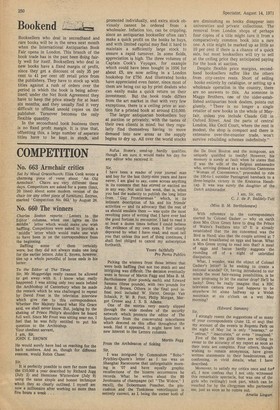Bookend
Booksellers who deal in secondhand and rare books will be in the news next month when the International Antiquarian Book Fair opens in London, This branch of the book trade has in the past been doing fairly well for itself. Booksellers who deal in new books have a fixed margin of profit, since they get a discount of only 35 per cent to 41 per cent off retail price from the publishers. They have to stock up with titles against a rush of orders over the period in which the book is being advertised; under the Net Book Agreement they have to keep the price steady for at least six months; and they usually find it very difficult to offload unsold copies on the publisher. Turnover becomes the only flexible quantity.
In the secondhand book business there is no fixed profit margin. It is true that. offsetting this, a large number of separate titles have to be kept in stock, and
promoted individually, and extra stock obviously cannot be ordered from a wholesaler. Inflation too, can be crippling, since an antiquarian bookseller often can't make a quick profit on the books he buys, and with limited capital may find it hard to maintain a sufficiently large stock to ensure a rapid turnover. In some fields, appreciation is high. The three volumes of Captain Cook's Voyages, for example which could have been bought in 1956 for about £5, are now selling in a London bookshop for £750. And illustrated books have appreciated even faster, since most of them are being cut up by print dealers who can easily make a quick return on their investment. But the book trade differs from the art market in that with very few exceptions, there is a ceiling price at auction for a printed book at around £10,000.
The larger antiquarian booksellers buy at auction or privately, with the tastes of their own clients in mind; but they regularly find themselves having to move demand into new areas as the supply begins to dry up. All over the world stocks
are diminishing as books disappear into universities and private collections. The removal from London shops of perhaps four copies of a title might turn it from a comparatively common book into a rare one. A title might be marked up as little as 10 per cent if there is a chance of a quick sale, but most booksellers will try to sell at the ceiling price they anticipated paying for the book at auction.
Despite flexible price margins, secondhand booksellers suffer like the others from city-centre rents. Short of selling books entirely by catalogue, or setting up a wholesale operation in the country, there are no answers to this. As someone in Maggs Brothers, one of the older-established antiquarian book dealers, points out glumly, "There is no longer a single retailer of new books in the whole of Mayfair, unless you include Claude Gill in Oxford Street. And the parts of central London, like Cecil Court, where the rent is modest, the shop is compact and there is extensive over-the-counter trade, won't survive rebuilding schemes indefinitely."


































 Previous page
Previous page